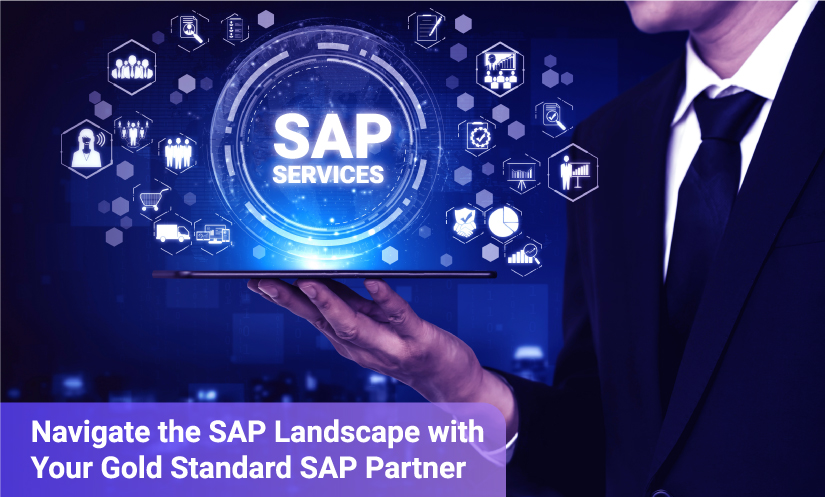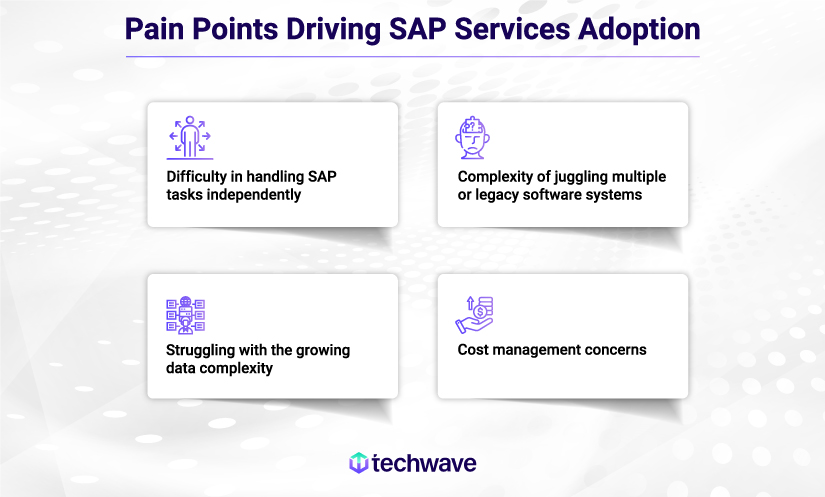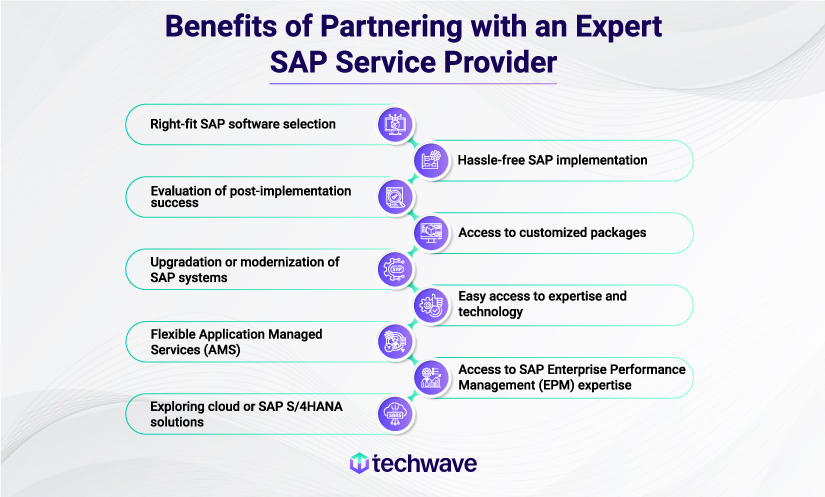
Companies today leverage digital platforms for efficiency and reinvention, with ERP as a key foundation. While multiple brands operate in the sector, SAP is arguably the most renowned Enterprise Resource Planning (ERP) software. As Forbes Advisor puts it – SAP is the most popular among ERPs because of its sizable market share. It is used by around 39,668 companies and 75,000 customers across 120 countries. Also, SAP was the first ERP solution that empowered users to create custom modules or components and select specific features for their company.
SAP ERP Evolution: From Inception to Industry Leadership
SAP’s journey began – with a single financial accounting system called RF way back in 1972. Fast forward, and it morphed into the powerhouse ERP system, SAP ECC, dominating the market with versions like 5.0 and 6.0. But SAP didn’t stop there. They knew businesses were diverse, so they branched out with industry-specific solutions, catering to everyone from carmakers to healthcare providers.
Then came the game-changer: SAP HANA in 2011. This wasn’t just an upgrade; it was a revolution! Analyzing data went from days to seconds, supercharging business decisions. And in 2015, SAP S/4HANA was born, built exclusively on HANA’s lightning speed.
However, the ERP market is a battlefield. SAP encounters substantial challenges in a fiercely competitive ERP market, with solid rivals in close pursuit. Yet, SAP remains a leader thanks to its focus on cloud flexibility. They don’t lock you in; you can choose from the top hyperscale cloud providers. This adaptability earned them the title of Leader in Gartner’s Magic Quadrant™ for SAP S/4HANA Cloud in ERP for Service-Centric Enterprises!
But wait, there’s more – In January 2021, SAP launched RISE with SAP, a premium package integrating AI, sustainability, and advanced finance, propelling innovation and data insights to new heights.
So, here’s the question – With all these new features and offerings from SAP, why do you still need a SAP service provider? Think of SAP ERP as a powerful car. You need an expert mechanic to handle its complexities and keep running smoothly.
Plus, the SAP landscape constantly evolves, throwing new features, integrations, data, and cloud choices your way. It’s like trying to keep up with the latest and upcoming disruptions in tech – overwhelming! SAP service providers help you navigate these changes, ensuring your business stays relevant.
Pricing, deployment, and industry adaptations are other areas where SAP partners can be your secret weapon. They can help you find the best deals, choose the right deployment options, and tailor SAP ERP solutions to your industry needs.
So, if you are ready to embark on your SAP journey or take it to the next level, this blog will help you understand why SAP ERP services are a lifesaver, who needs them, and how to find the perfect partner for your journey.
Achieving Expected ROI in SAP Investments Can Be Challenging!
The SAP ERP market rapidly evolved by offering comprehensive solutions like advanced analytics, real-time data processing, scalability, open APIs for flexible integrations and interoperable systems, and diverse cloud models (like SaaS) to adapt to growing business needs. While user-friendliness improved, extracting true ROI remains a challenge for many companies.
Imagine juggling all those back-office departments like Finance, HR, Sales, and even emerging AI teams – all using your SAP ERP, each with evolving needs! Getting everyone in sync across a disrupted landscape can be a complex puzzle. The promised ROI of SAP implementation often feels distant amidst these challenges.
Here’s a snapshot of the critical challenges enterprises commonly face.

● Handling SAP tasks independently
Businesses often lack the resources, including employees and necessary assets, to generate the full capabilities of an SAP ERP system internally. Integrating data across departments becomes a juggling act, neglecting core tasks like product development and industry-specific projects. Even if you manage internally, can you truly innovate and chase profits? Customization adds another layer of complexity to an already resource-strained situation. Managing SAP tasks independently becomes a challenge.
● Juggling multiple or legacy software systems
Fast growth and acquisitions expose the cracks in your legacy systems as they lack the scalability and flexibility to handle your expanding needs. Diversification screams for modernization, but compatibility concerns lurk during upgrades. Plus, looming end-of-support deadlines add urgency to the modernization needs, forcing a critical decision: update or overhaul?
But the journey isn’t smooth. New SAP cloud ERP, while powerful, faces user resistance – employees clinging to familiar, inefficient practices. This undermines deployment and ROI.
Finally, evolving business needs require upgraded processes, automation, and advanced features. For instance, a Gartner report states that by 2023, 65% of CIOs predict that ERP vendors will integrate artificial intelligence (AI) into ERP systems across industries. In line with this, SAP offers SAP Business AI to improve the sales process by minimizing the effort needed to generate quotes for configurable products, ensuring a customer-centric approach based on their actual needs. Trained on sales data, including opportunities, quotes, and orders, the AI recommends the optimal product and configuration to fulfill customer requirements, fast-track business goals, and ensure customer satisfaction.
With such critical benefits knocking on the door, ignoring these calls stifles long-term success.
● Managing the growing data complexity
Data complexity is a ticking time bomb for growing businesses. Juggling diverse departmental data strains resources and budgets, while siloed information hinders communication, collaboration, and accuracy.
Many believe they’ll install an SAP ERP system later when “real” data challenges arise, mistakenly believing “limited” data is the issue. However, data quantity is just the tip of the iceberg. The real challenge lies in organizing, interpreting, and effectively using it. Even limited data today, if poorly integrated, can be a growth-stunting roadblock.
● Cost management
SAP ERP promises power, but choosing the wrong system can lead to million-dollar disasters. Off-the-shelf options rarely offer the perfect fit, forcing companies towards costlier, custom-built platforms. These solutions cater to “typical” companies, offering varying costs per user based on the developer, modules included, business size, and more. For example, over a 5-year period, a mid-sized business with 100 users might expect to pay $170,840 annually for its ERP system, covering both the system itself and implementation costs.
So, is the “one-size-fits-all” approach worth the risk? Or is a custom-built solution the key to unlocking true efficiency and growth?
Your existing SAP ERP should be a growth engine. But if ROI is lagging, these challenges are likely the culprit. Tackling them solo can be risky and expensive. What you need is an SAP service provider by your side.
What are SAP ERP Services?
SAP ERP services unlock a suite of integrated software to supercharge your organization’s core processes and the services to manage them. It entails consulting, developing, customizing, implementing, integrating, optimizing, and testing the SAP system to help organizations manage core business functions. Additionally, this being the cloud era, it includes all the mentioned services across business models – on-prem, hybrid, and cloud.
The cloud has decisively won the platform competition for services-centric ERP and Professional Services Automation (PSA) deployments across organizations of all sizes today. Global spending on public cloud services is expected to rise by 20.4% in 2024, attributed to both price increases by cloud vendors and rampant adoption.
If not for SAP service providers, the above would seem very intimidating; they genuinely take the weight off your shoulders!
SAP Service Provider – Partnering a Must to Optimize Business Processes
Seasoned SAP service providers have seen it all – from startups and SMEs to large companies across diverse industries. They go beyond a quick sale, investing time to understand your people, processes, and existing tech because the right ERP isn’t a one-size-fits-all solution. It’s a bespoke suit for your unique goals and growth ambitions. Here’s how SAP service providers help you craft the perfect fit; they help you-

Find the perfect SAP solution for your accounting, inventory, supply chain, and order management needs. You get access to the best solution with the highest level of customization at your fingertips.
- Leave the implementation and management to the SAP service providers, saving time and cost while boosting quality and responsiveness throughout the ERP system’s lifecycle.
- Align your business strategy with SAP ERP and technology, ensuring a robust business case and mechanisms for evaluating post-implementation success.
- Choose specific SAP ERP services for distinct needs (e.g., HR, finance) and avoid unnecessary expenses, like a complete package (need-based).
- Upgrade your SAP system with modern functionalities and eliminate compatibility issues. Enjoy continuous improvement and optimization—additionally, track compliance with Service Level Agreements (SLAs). For example, SAP partners ensure certain functionalities and timely security updates whenever required, with adequate training to use the system to its full potential.
- Tap into expertise and technology you wouldn’t have access to otherwise, freeing up your resources for core business functions.
- Get a flexible Application Management Services (AMS) solution customized to your IT and business objectives for a consolidated and accurate view of your operations. For example, if a company requires a more consolidated and precise view of its financials and inventory services, the SAP AMS provider can create a consolidated suite for both services.
- Leverage Enterprise Performance Management (EPM) consultants with project-based or long-term support options for your corporate planning, analytics, and reporting needs to evaluate the company’s performance initiatives. For example, a performance evaluation of an SMB managing multiple client projects may reveal that it could benefit from service-centric SAP cloud ERP solutions for streamlined project management.
- Eliminate non-value-added processes and gain scalability, flexibility, and anytime-anywhere access with cloud or SaaS solutions like SAP S/4HANA, along with nearly infinite scalability and innovation capabilities.
Who Needs SAP ERP Services?
The relevance of SAP ERP often depends on the complexity of operations, regardless of the business’s size. The need for SAP-managed services and solutions is observed in:
- Diverse Industries
All industries, including healthcare, retail, education, manufacturing, education, construction, etc., need ERP. For instance, a manufacturing company builds cars by procuring parts and components from multiple third-party suppliers. SAP ERP implemented by a reliable partner can be used to track the requisition and purchase of these goods. In addition, this advanced SAP technology can help ensure that all components across the procure-to-pay process use accurate, uniform data connected to the company’s workflows, business processes, reporting, and analytics.
For example, SAP SRM helps analyze purchasing patterns, streamline procurement cycles, engage with partners (supplier collaboration) in real-time, foster enduring relationships with reliable suppliers, and deliver lasting benefits. - All-size businesses
The idea that SAP systems are only for large corporations is a long-held misconception. While the benefits of SAP ERP are undeniable for big businesses, the truth is that these powerful SAP tools can be just as transformative for small and medium-sized enterprises (SMEs).
For example, small businesses can leverage SAP Business One. It is a cost-effective, unified SAP solution designed to oversee small business operations. This includes managing accounting, financials, purchasing, inventory, sales, customer relationships, reporting, and analytics.
Here’s why you shouldn’t let the “big business” label deter you:
Today’s SAP solutions are scalable, adapting to your evolving needs as your business flourishes. You can start small with essential SAP modules and easily add functionalities as you expand. For example, if you have a small retail business, initially, you can start with essential SAP modules like SAP SD (Sales and Distribution) and SAP FI (Financial Accounting). As your business flourishes, you can add on SAP MM (Materials Management), SAP CRM (Customer Relationship Management), and SAP BW (Business Warehouse) and meet the evolving business requirements.
Many SAP ERP options offer subscription-based models, making them budget-friendly for even the smallest teams. - Businesses struggling with efficiency and growth pains
As your business scales, manual processes, and fragmented data become bottlenecks. You may also face communication gaps, poor access to real-time data and analytics, insufficient insights, cloud migration hassles, inefficient customer service, security and compliance challenges, legacy infrastructure concerns, or an inability to reap ROI from existing SAP systems.
Any of these concerns imply you fall into the ‘needs SAP ERP services’ category because SAP-managed services help streamline business operations to lower costs and enhance productivity.
Any of these concerns imply you fall into the ‘needs SAP ERP services’ category because SAP-managed services help streamline business operations to lower costs and enhance productivity.
So, who needs SAP ERP services (providers)?
Any business that wants to grow, operate efficiently, and thrive in today’s competitive landscape.
How to Get Started?
Outsourcing SAP services isn’t a handoff; it’s a strategic handshake. Here’s your guide to finding the perfect partner for growth.
- Assess and prioritize: Identify pain points, list essential SAP modules, and prioritize SAP ERP features. What challenges have necessitated your need for an SAP service provider? Research systems, gather requirements, and form a project team with key stakeholders.
- Find your ideal partner: The market is awash with SAP service providers. How do you select the right partner for your requirements?
- Industry expertise: Assess their expertise in the specific industry. An ideal partner will have a successful track record of implementing SAP-based ERP systems for companies of similar size and in the same industry.
- Solutions roadmap: Consider how the partner plans to enhance, expand, and support its SAP services as your business grows. This involves understanding the future roadmap, additional SAP features, and functions.
- Customization capability: Your SAP services partner must be capable of providing the highest level of customization for your SAP solution, with experience in integrating it with other third-party services.
- Diverse service offerings: Look for a partner with a wide range of services to meet various evolving needs.
- Post-implementation support: Ensure your SAP partner is committed to a long-term technological partnership. They should offer support throughout data migration and provide ongoing maintenance and assistance, including SAP system updates, troubleshooting, and continuous user training.
- In addition to the above, businesses must compare pricing, SAP ERP software capabilities, reputation, and customer service. Ensure they offer the support you need.
- Goals and budget alignment: Define SAP ERP objectives (efficiency, cost savings, etc.) and set a realistic budget covering implementation, training, and maintenance. Consult finance to determine a spending limit and choose a package that fits your budget.
- Communicate transparently:
- Set expectations, timelines, and deliverables clearly.
- Stay involved, ask questions, and provide feedback.
- Discuss and establish output-based Service Level Agreements (SLAs).
- Train and empower: Custom-fit training to roles and responsibilities, ensuring all users understand the SAP business system and its potential. Monitor usage closely to address data accuracy or consistency issues.
Techwave – Your Ideal SAP Services Partner
Techwave, an accredited SAP Gold Partner and a prominent member of the SAP global community for nearly 20 years, empowers businesses of all sizes to unlock their full potential with robust, resilient, and reliable ERP services.
Established in 2004, we initially provided traditional SAP BI & EPM services, including Cognos and Informatica. By 2008, our services expanded to cover SAP ERP development and support, Enterprise EDW & HANA, JAVA, .Net, and SharePoint development and support. Driven by a dedicated leadership team and our in-house Center of Excellence (established in 2013), we’re at the forefront of continuous innovation. Today, we’re a global end-to-end IT services and solutions provider. Partnering with top-tier tech leaders, we have been a trusted partner to over 200 global enterprises.
Get the right-sized SAP ERP support, from strategic consulting to cloud deployment, SAP ERP implementation, and optimization, all tailored to your specific needs. Recognized for excellence, Techwave also holds certifications in cloud infrastructure hosting, SAP HANA, and SAP S/4HANA public cloud solutions, ensuring seamless and secure deployments for your peace of mind.
Remember, an SAP ERP system is an investment in your future, not just a software package. Don’t let outdated perceptions hold you back. Embrace the power of robust SAP partnerships and watch your business flourish, regardless of its size.
Check out one of our many SAP success stories and let Techwave be your right-sized partner for success. Contact us today for more information.
Stay tuned for more information on some of the cutting-edge SAP offerings in our upcoming SAP blog series.
